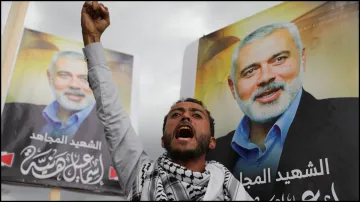Ismail Haniyeh's assassination: Implications and chaos in the Middle East - What it means for India?
The killing of Hamas leader Ismail Haniyeh, after the death of a senior Hezbollah commander, has thrown the Middle East into a fresh wave of chaos as Israel is bracing for a retaliation from Iran. The ongoing unrest in the region has deep consequences for a number of countries, including India.

From Hamas to Hezbollah, the turbulent Middle East has been thrown into chaos once again as fears of an all-war conflict involving Israel have once again returned to the centre of everyone's attention - this time the trigger was Hamas chief Ismail Haniyeh's brazen assassination in Tehran. Such a high-profile Hamas leader being killed in the heart of the country is bound to have dire ramifications not just for the region, but also India.
Ismail Haniyeh was declared dead after an explosion rocked his guesthouse in Tehran, where he was attending Iran President Masoud Pezeshkian's swearing-in ceremony. Union Minister Nitin Gadkari was also a guest for the same event. Many reports suggest a complicated operation involving smuggled explosives that were planted at the guesthouse months ago - underscoring how such a shocking attack evaded Iran's intelligence agencies and defence systems directly in the capital of a well-armed nuclear-capable country with a strong military.
No matter how anyone sees it, the attack on Haniyeh has caused a deep sense of embarrassment for Iran's Islamic Revolutionary Guard Corps (IRGC), exposed the critical failure of its intelligence and security services and dealt a huge blow to Hamas in the almost ten-month long war. While Israel has not commented on its role in the attack, Iran and Hamas have blamed it and threatened retaliation. As Iran cannot let this slide, the Middle East is once again heading towards a full-blown conflict.
What is happening in the Middle East now?Haniyeh was the face of Hamas' international diplomacy and played a role in extending communication with foreign diplomats, including in indirect peace talks. He was the chief of the militant group's political bureau and is recognised as one of the first advocates of Hamas' inclusion in politics, having formerly served as the Palestinian PM. His death is the most significant blow to Hamas since the October 7 attacks on Israel.
Israel and Iran have been at a shadow war for decades, which changed after Iran's largest drone and missile attack on April 13 in retaliation for an Israeli strike on its embassy in Syria that killed several Iranian military commanders. While tensions had cooled then, the attack on Tehran will be seen as a major escalatory move that Iran will be compelled to respond to, forcing reformist president Pezeshkian's hand. Israel, bracing for an Israeli response, has mobilised its forces and threatened to "exact a heavy price" for any form of aggression.
The attack has also upended the ongoing ceasefire negotiations between Israel and Hamas for the time being to end the war in Gaza, which has killed around 40,000 Palestinians, a setback for US President Joe Biden's ambitious diplomatic gamble and efforts for a two-state solution. The US has promised to defend Israel against Iran's attacks and has announced a massive military deployment in the region. The issue remains deeply worrisome for the US, which is gearing up for elections in November.
India's diplomatic tightropeIndia has remained silent on the recent developments in the Middle East, which is a sensitive issue as New Delhi shares close relations with both Israel and Iran. However, the conflict would have consequences not only for the flammable Middle East but for India as well. The immediate concern for India is the safety of at least 9 million Indians living in the region, including 18,000 in Israel and 4,000 in Iran.
- India's relations with Israel: While supporting Palestinian statehood for decades, India now shares a very close relationship with Israel, as shown in the bonhomie between PM Narendra Modi and his Israeli counterpart Benjamin Netanyahu. Bilateral trade between the two countries rose to around $10.7 billion in 2022-23. India is also looking at Israel for its defence requirements as it seeks alternative sources from Russia.
- India's relations with Iran: India has enjoyed years of friendly relations with Tehran, with a particular focus on trade, technology and connectivity. India is among Iran's top five partners and is cooperating closely in the development of the Chabahar Port to establish a regional hub for the movement of humanitarian and commercial goods. India recently signed a 10-year agreement with Iran to take over management of the Shahid Beheshti Port.
As India is establishing a leadership role in the global stage, it has had to carefully manage its words in the context of the brewing conflict between Iran and Israel. After the October 7 attacks on Israel, India was the first to condemn the "terrorist" attacks, but refrained from designating Hamas as a terrorist organisation. In several multilateral meetings, India has referred to the Hamas-led attacks on Israel as "terrorism", but has also strongly called for a ceasefire in Gaza and advocated for a two-state solution on the Palestinian issue, which Israeli authorities oppose.
India's relations with the two countries are also linked to its growing ties with the United States, which is Israel's closest ally in the Middle East, and its dependence on energy from the region. As such, the latest chaos will be a source of worry for New Delhi and it remains to be seen how it handles the conflict that can affect both its diplomacy and economy.
ALSO READ | Israeli airstrike kills five in West Bank, including Hamas commander amid boiling regional tensions